Philip Alan Wright (1903-1968) was an English cricketer active from 1921 to 1929 who played for Northamptonshire. He appeared in 93 first-class matches as a righthanded batsman who bowled right arm medium pace. One of three brothers who played cricket, Wright was born in Kettering on 16 May 1903 and died there on 21 December 1968. He scored 1,459 runs with a highest score of 83 and took 343 wickets with a best performance of six for 37. He also played for Cambridge University and represented the Gentlemen in a Gentlemen v Players match in 1924. [1]

William Gilbert Grace was an English amateur cricketer who was important in the development of the sport and is widely considered one of its greatest players. He played first-class cricket for a record-equalling 44 seasons, from 1865 to 1908, during which he captained England, Gloucestershire, the Gentlemen, Marylebone Cricket Club (MCC), the United South of England Eleven (USEE) and several other teams.
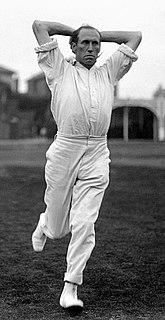
John Barton "Bart" King was an American cricketer, active in the late 19th and early 20th centuries. King was part of the Philadelphia team that played from the end of the 19th century until the outbreak of World War I. This period of cricket in the United States was dominated by "gentlemen cricketers"—men of independent wealth who did not need to work. King, an amateur from a middle-class family, was able to devote time to cricket thanks to a job set up by his teammates.

Reginald Erskine Foster, nicknamed Tip Foster, commonly designated R. E. Foster in sporting literature, was an English first-class cricketer and footballer. He is the only man to have captained England at both sports.
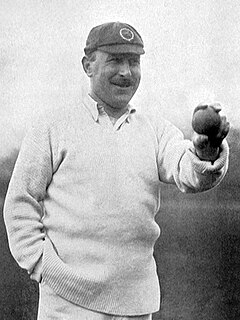
George Herbert Hirst was a professional English cricketer who played first-class cricket for Yorkshire County Cricket Club between 1891 and 1921, with a further appearance in 1929. One of the best all-rounders of his time, Hirst was a left arm medium-fast bowler and right-handed batsman. He played in 24 Test matches for England between 1897 and 1909, touring Australia twice. He completed the double of 1,000 runs and 100 wickets in an English cricket season 14 times, the second most of any cricketer after his contemporary and team-mate Wilfred Rhodes. One of the Wisden Cricketers of the Year for 1901, Hirst scored 36,356 runs and took 2,742 wickets in first-class cricket. In Tests, he made 790 runs and captured 59 wickets.
Gentlemen v Players was a long-running series of English first-class cricket matches, between teams consisting of amateur (Gentlemen) and professional cricketers (Players).
Arthur Haygarth was a noted amateur cricketer who became one of cricket's most significant historians. He played first-class cricket for the Marylebone Cricket Club and Sussex between 1844 and 1861, as well as numerous other invitational and representative teams including an England XI and a pre-county Middlesex. A right-handed bat, Haygarth played 136 games now regarded as first-class, scoring 3,042 runs and taking 19 wickets with his part-time bowling. He was educated at Harrow, which had established a rich tradition as a proving ground for cricketers. He served on many MCC committees and was elected a life member in 1864.

Herbert Tremenheere "Herbie" Hewett was an English amateur first-class cricketer who played for Somerset, captaining the county from 1889 to 1893, as well as Oxford University and the Marylebone Cricket Club. A battling left-handed opening batsman, Hewett could post a large score in a short time against even the best bowlers. Capable of hitting the ball powerfully, he combined an excellent eye with an unorthodox style to be regarded at his peak as one of England's finest batsmen.
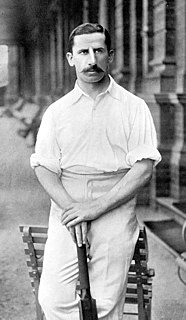
Sir Sydney Herbert Evershed was an English brewer and cricketer who played first-class cricket for Derbyshire from 1880 to 1901 and was a long-serving club captain from 1891 to 1898.

Arthur Temple Lyttelton was an Anglican Bishop from the Lyttelton family. After studying at Eton College and Cambridge University, he was ordained as a priest in 1877, and was a curate at St Mary's in Reading. He later served as vicar in Eccles, before being appointed as the third Suffragan Bishop of Southampton. He gave and published a number of lectures relating to his faith, and was the Hulsean Lecturer in 1891. He was also one of eleven members of the Lyttelton family to play first-class cricket.
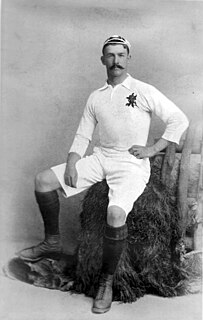
James Frederick Byrne was a sportsman who captained Warwickshire at first-class cricket and was capped in rugby for both England and the British and Irish Lions.

Harold Clark McDonell was an English first-class cricketer. McDonell was a right-handed batsman who was a leg break bowler who played as an all-rounder.
Arthur William Ridley was an English first-class cricketer. Ridley was a right-handed batsman who bowled right-arm underarm medium pace. He also played occasionally as a wicket-keeper.
Lionel Lord Cranfield played first-class cricket for Gloucestershire and Somerset between 1903 and 1922. He was born in Brixton, London and died at Sale, Cheshire.
The Rev. Charles Edward Burroughs Nepean was an English amateur cricketer and footballer who later became a vicar in the Church of England. As a cricketer he played ten first-class matches for Oxford University and Middlesex between 1870 and 1874, whilst in football he was in goal for Oxford University, the winning side in the 1874 FA Cup Final.
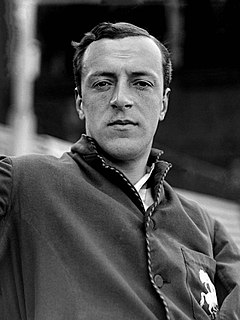
Bernard James Tindal Bosanquet was an English cricketer best known for inventing the googly, a delivery designed to deceive the batsman. When bowled, it appears to be a leg break, but after pitching the ball turns in the opposite direction to that which is expected, behaving as an off break instead. Bosanquet, who played first-class cricket for Middlesex between 1898 and 1919, appeared in seven Test matches for England as an all-rounder. He was chosen as a Wisden Cricketer of the Year in 1905.
Godfrey Keppel Papillon was an English cricketer. Papillon was a right-handed batsman.
John Morley Lee was an English clergyman and cricketer who played in first-class cricket matches for Cambridge University, Surrey, Marylebone Cricket Club (MCC) and various other amateur teams in the late 1840s. He was born at Chelsea, London and died at Botley, Hampshire.
Hugh Rotherham was an English cricketer who played first-class cricket for a wide variety of amateur teams between 1880 and 1903, including the Marylebone Cricket Club (MCC) and the Gentlemen, and a single first-class match for Warwickshire. He was born and died at Coventry.
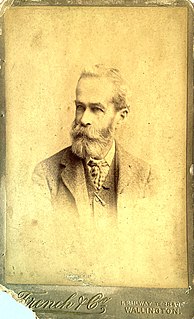
Harry Moody was an English first-class cricketer and civil servant.